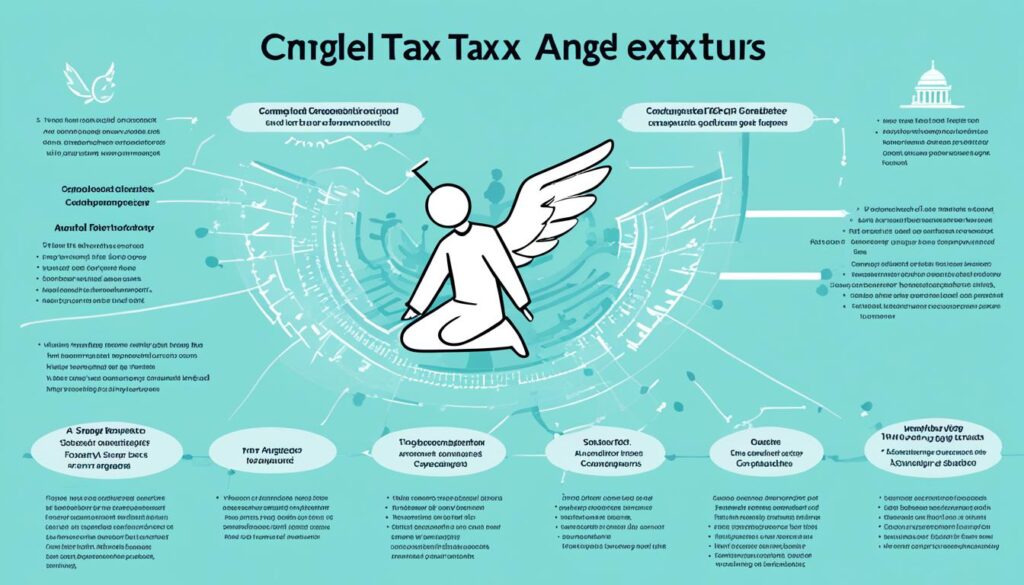Hyderabad , India
Have you ever thought about how a simple tax could change startup funding in India? The Angel Tax for Indian Startups is quite interesting. It mixes with our startup world, touching on tax rules and government policies. We’ll look into the Angel Tax, its effects on funding, and how some startups might get relief.
Since 2012, the Angel Tax has hit investments over fair market value with a 30.6% penalty. This tax has hit the startups we need to boost our economy. With over 98,119 startups recognized by the Department for Promotion of Industry and Internal Trade as of April 30, 2023, we need clear rules and changes in this tax. It’s key to see how these policies affect our growth and the help we can get. Let’s explore the Angel Tax and how to deal with it.
Key Takeaways
- The Angel Tax, introduced at a rate of 30.6%, significantly affected early-stage investments.
- Recent abolitions of the Angel Tax could increase local investor activity in startups by 10-20%.
- Over 750,000 jobs have been generated through the startup ecosystem in India.
- Exemptions are available for government-recognized startups, emphasizing the need for tax compliance.
- Revised regulations encourage funding from foreign investors while addressing market valuations.
Introduction to Angel Tax
Angel tax, also known as Section 56(2)(viib) of the Income Tax Act (ITA), started in 2012. It affects unlisted companies getting investments from angel investors at a price higher than their true value. This tax has become a big issue for Indian startups in the startup world.
Startups in our community face many funding challenges, making it hard to get early-stage money. The angel tax can stop potential investments because it adds more cost for entrepreneurs. This tax has made it tough for startups to grow.
Finance Minister Nirmala Sitharaman’s decision to drop the angel tax is a big step forward for innovation in India. This move aims to help the startup ecosystem by removing growth barriers for entrepreneurs.
Angel investors are crucial for new businesses, often being their main support. Ankur Mittal, Co-founder of Inflection Point Ventures, says removing the angel tax will bring clear rules for startups. This will help both founders and investors, making investing more appealing.
Before, over 2,000 startups got tax notices by December 2018. The tax rate was 30.9%, putting a lot of pressure on startups like ABC. They paid Rs. 6.9 crore in tax on an extra Rs. 22.5 crore over true value.
The government plans to give tax breaks for investments from sovereign wealth or pension funds until March 2025. This shows they understand the startup ecosystem’s needs. Dropping the angel tax looks promising for Indian startups.
What is Angel Tax?
Angel tax is a key part of taxes for startups in India. It comes from Section 56(2)(viib) of the Income Tax Act of 1961. This tax hits when startups get money from angel investors at a price higher than the shares’ true value. For example, if a startup gets Rs 15 crore but its shares are really worth Rs 10 crore, the extra Rs 5 crore gets taxed at 30.9%.
The goal of angel tax is to stop money laundering and control how startups get funded. Angel investors, with lots of money, take big risks to help startups grow early on. To avoid this tax, startups must not have more than ten crore rupees in total shares and premiums.
Investors also have rules to follow, like making at least twenty-five lakh rupees a year for three years or having a net worth of two crore rupees. Figuring out the shares’ true value is key, which can be done for Rs. 50,000 with a SEBI registered Category-I merchant banker.
Knowing about angel tax and its effects on investments is key for startups in India.
| Criteria | Details |
|---|---|
| Maximum Paid-Up Capital | 10 crore rupees |
| Minimum Average Returned Income | 25 lakh rupees for preceding three years |
| Minimum Net Worth | 2 crore rupees |
| Effective Tax Rate | 30.9% (including cess) |
| Number of Startups Certified for Exemption | 88 under Section 80 IAC |
In summary, angel tax is a big deal for startups in India. It affects how investors work with new companies and helps shape their financial futures.
The Application of Angel Tax
The angel tax applicability has changed a lot, especially with new reforms. Now, the tax hits startups when they get more money than their shares are worth. For Indian startups, knowing the investment thresholds is key. This is because it tells us when the tax kicks in.
Under section 56(2)(viib) of the Income Tax Act, getting angel investment can lead to a tax bill. This happens if the money you get is more than what the shares are really worth.
The Indian government’s move to stop angel tax is a big deal for startups. It’s meant to help startups grow and bring in more money. But, we need to know how this change works. The new funding definitions and rules about net worth make sure investments are real and smart.
For example, angel investments can get a tax break up to ten crore rupees. But, investors must have a net worth of two crore rupees and show they made twenty-five lakh rupees on average over three years.
By following these rules, we can plan our funding better and stay legal. Knowing about investment thresholds and angel tax applicability helps us improve our fundraising. It also helps us move our innovations forward.
| Criteria | Details |
|---|---|
| Aggregate Amount for Tax Exemption | Ten crore rupees |
| Minimum Net Worth for Investors | Two crore rupees |
| Minimum Average Returned Income | Twenty-five lakh rupees over three financial years |
| Effective Rate of Angel Tax | 30.9% (30% + 3% cess) |
| Paid-up Capital for Exemption | Up to 25 crores |
Angel Tax for Indian Startups: Key Features
The angel tax has a big impact on startup funding in India. At first, it was set at 30.6% for companies that sold shares for more than their true value. This scared off investors and made it hard for startups to get funding. Startups with more than Rs 25 crore in paid-up capital lost their chance for tax breaks.
This tax was a big burden on startups and could have shut some down. But now, with the angel tax gone, things are changing. The removal of this tax is expected to bring in more investors by 10-20%. This means more people will be willing to invest in new companies.

Before, dealing with angel tax was hard for startups. They had to go through a tough process to get tax breaks. Now, things are simpler. This change will help companies deal with taxes faster and make investing easier.
Startups that got tax breaks before had to meet certain criteria. They had to be young, make less money, and have a certain type of business. Now, with the angel tax gone, India’s startup scene is set to grow. This will draw in both local and international investors looking to fund new ideas.
For more details on how these tax changes affect startups, check out this article. It has lots of info on the topic.
| Key Feature | Description |
|---|---|
| Tax Rate | Previously 30.6% on excess capital over fair market value. |
| Eligibility | Startups with paid-up capital > Rs 25 crore cannot claim exemptions. |
| Impact on Investment | Expected increase of 10-20% in active domestic investors. |
| Complexity of Exemptions | Startups faced challenges navigating the exemption process. |
| Current Status | Angel tax abolished as part of the Union Budget 2024. |
Impact of Angel Tax on Startup Funding
The angel tax in India changed how startups get funding. It was meant to stop money laundering but has caused big problems. In 2023, funding for startups fell by 60% to $10 billion. This shows how the impact of angel tax affects investors and the market.
Investors worry about the risks of angel tax, which can be up to 30% for startups. This makes them less likely to invest in Indian startups. Startups struggle because they’re judged on growth, not just their business size. This has led to a big drop in investment.
The angel tax makes things hard for investors, like figuring out a startup’s value. This has scared off investors and caused some entrepreneurs to leave the country. The new tax rules from October 2023 try to help, but the impact of angel tax on investors is still there.
We think getting rid of the angel tax will make investors more confident. This could bring in more money and help startups grow in India. By making things better for investors, we can help startups do well. This could bring big benefits to the economy in areas like healthcare, education, and tech.
For more info on how startups are financed and the challenges they face, check out this resource.
Drawbacks of Angel Tax
The angel tax has big challenges for entrepreneurs in India. It affects how startups operate. Introduced in 2012, it aimed to stop money laundering by controlling share valuations. But, it has hurt startup funding instead.
Only Indian investors face the angel tax, leaving startups without foreign funding at a loss. This limits their growth. The rules make paperwork hard, causing financial stress for many startups.
Now, the government might extend the angel tax to foreign investors, worrying investors. In 2022, funding for Indian startups fell by 33%, partly due to the angel tax. Clear rules on valuations and exemptions are key for startups to succeed.
Getting a tax notice could shut down a business. This uncertainty makes it hard for entrepreneurs to succeed. Removing the angel tax could boost investor trust and help startups grow and innovate.
| Aspect | Current Situation | Expected Change |
|---|---|---|
| Funding Limitations | Only resident Indian investors impacted | Potential expansion to foreign investors |
| Tax Rate | Exceeds 30% on inflated valuations | Removal expected to boost investor confidence |
| Startups Recognized | Approx. 1.44 lakh by DPIIT | Increase in active investors anticipated |
| Impact on Funding | Funding dropped by 33% in 2022 | Increased funding and growth expected |
Understanding Angel Tax Exemptions
Angel tax exemptions help startups in India by easing their financial stress. The government sees the value of innovation and has set clear rules for these exemptions. This part will cover what startups need to know about these exemptions and how to apply for relief from angel tax.
Eligibility Criteria for Exemptions
To get angel tax exemptions, startups must meet certain requirements, including:
- Being recognized by the DPIIT.
- Having a paid-up capital of Rs 25 crore or less.
- Following documentation rules, like providing SEBI-registered merchant banker reports.
Process for Applying for Exemption
The process to apply for angel tax exemptions is simple, with several steps:
- Gather needed financial documents and check if you meet the criteria.
- Work with a SEBI-registered merchant banker for an independent valuation.
- Submit your exemption application with the valuation report.
- Wait for approval from the authorities to get exemptions and lower your tax.
Startups should understand these rules well as they manage their finances. Following the eligibility and applying correctly can greatly improve their chances of getting angel tax exemptions.
Changes to Angel Tax in 2023 Budget
The 2023 budget has brought big changes for Indian startups. It has abolished the angel tax starting FY 2024-25. This tax, introduced in 2012, aimed to fight money laundering but hurt new businesses instead. It led to a 60% drop in startup funding in 2023, down to just $10 billion.
These changes are a big deal for encouraging new businesses in India. Without the angel tax, startups can keep more money. This will help them grow and innovate. It’s part of India’s plan to create a million startups in five years and reach a $10 trillion economy by 2030.
The 2023 budget also tweaked income tax rules. It changed how to calculate fair market value and set rules for “overvalued” shares. These changes will make it fairer for both Indian and foreign investors. Now, removing the angel tax will bring in more capital and make our startup scene stronger. This will help both entrepreneurs and investors.
FAQ
What is angel tax and why is it relevant for Indian startups?
Angel tax is a tax on unlisted companies getting funds from angel investors at more than the fair market value. It’s key for Indian startups as getting early funding depends on understanding angel tax rules.
How does angel tax impact startup funding?
Angel tax can lead to big financial issues, hurting investor trust. It makes getting funding hard, which slows down India’s startup growth.
What are the key features of angel tax?
Important points include limits on paid-up capital and investment types. Startups with over Rs 25 crore in paid-up capital don’t get angel tax exemptions, affecting their funding.
Are there exemptions available for startups regarding angel tax?
Yes, the government has special exemptions for DPIIT-recognized startups. These startups can pay less tax if they meet certain paid-up capital limits.
What changes were introduced to angel tax in the 2023 Budget?
The 2023 Budget removed angel tax from FY 2024-25 to boost the startup scene in India. This change should make funding easier for startups.
How can startups apply for angel tax exemptions?
Startups can get exemptions by providing reports from SEBI-registered merchant bankers and meeting certain criteria, like paid-up capital limits. There’s a clear process to follow for this.
What challenges do startups face due to angel tax?
Startups face issues like fewer funding options and less investor interest. Angel tax only affects resident Indian investors, making it hard to find backers.
How do government policies influence the angel tax landscape?
Government policies greatly affect angel tax rules. New policies aim to help entrepreneurship by simplifying regulations and making funding more appealing.








